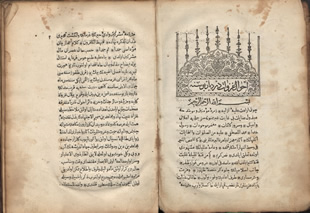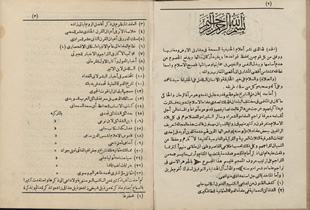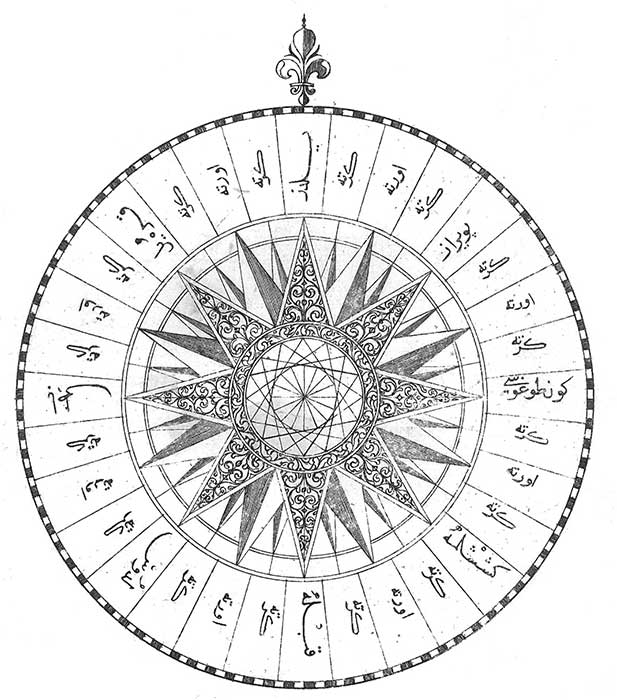Orientalistic fund
Fund of printed books in Arabic, Turkish, and Persian languages (Orientalistic fund)
Orientalistic fund contains printed books in Arabic, Turkish (Arabic letterings – Ottoman and Latin letterings), and Persian languages, as well as books printed in Arabic lettering in general, such as Bosnian arebica.
This fund consists of around 35.000 monographs of which more than 22.500 library units are cataloged and made available to readers. Among them are exceptionally valuable, old and rare books that, along with printed text, almost regularly include a seal, a handwritten word, or a verse by their owners or readers.
Especially significant are the earliest copies of books printed in the first Ottoman State Print Press, founded 1727, by Ibrahim Muteferrike. From 1729 to 1742, in this State Print Press, 22 volumes came out including total 17 titles of so-called Turkish incunabula of which Gazi Husrev-bey Library preserves 12, and some are presented in several copies.
The most notable ones are:
1. Kitāb-ı Lügāt-ı Wanqulu (Vankulu lugati dictionary printed in 1729) by Mehmed, son of Mustafa el-Vani (died 1592) O-55, O-56;
2. Tārīḫ-i Miṣr-i ḡadīd.(History of Egypt, printed in 1729) by Suhejli-efendi O-3451;
3. Ahvāl-i gazevāt der diyār-i Būsna (Ahval-i Gazevati der diyar Bosna, better known under the title of Tarih-i Bosna, printed in 1741) by Omer Novljanin who lived in the 18th century. O-2679, and O-9895. Those are the oldest printed books in the Library.
This fund also preserves the first printed copies of the first state Vilayet Printing Press in Bosnia and Herzegovina established in 1866 that printed the first Bosnian textbooks, official, and periodical publications. In the orientalistic fund, there are 14 volumes of this printing press issued in the period of 1282/1866-1341/1922. Books and periodicals printed comparatively in two letterings and two languages (Latin/Arabic letterings – Bosnian/ Turkish languages) represent a particular curiosity of the Library.
It is important to mention the Islamic Printing Press Ltd. founded in July of 1905 which worked without interruption until 1948 and printed almost every Bosniak newspaper. The fund includes its nine publications printed in Arabic lettering and published in the period of 1908-1938.
The orientalistic fund has also kept 150 publications by Hajji Muharrem-efendi Bosnevi ( Muharem Smajiš of Sarajevo) who worked outside Bosnia and Herzegovina, in Istanbul. His printing press was operational in the 19th century, from 1273-1309/1856-1892.
Together with the European fund, the Orientalistic fund of the Library shares a valuable and rare collection of alhamiado literature that includes literature in Bosnian language written in Arabic lettering called Arebica. The name derives out of Arabic word al-a’gamiyy meaning foreign, non-Arabic.
Our territory had been marked by abundant examples of alhamiado literature for as long as three and a half centuries. Arebica lettering had many times been adjusted to the phonetics of Bosnian language. The literature printed in this lettering and kept in the Library mainly deals with religious, ethical, and didactical subjects. The oldest printed copy of a work in Arebica that can be found in the Library is Maktab Calendar from 1307-1308/1889-1890.
The printed collection in oriental languages is composed of the classical Islamic scientific works (such as akhaid, akhlaq, hadith, tafsir, fikh, history of Islam, Islamic culture and civilization); social sciences, (philosophy, ethics, history, sociology, politics), as well as linguistics and literature (Arabic, Turkish, Persian, and Bosnian). However, there are also a few volumes of work in exact sciences (architecture, mathematics, medicine) that can be useful for the readers.
The fund is complemented with books printed in Cairo, Istanbul, Riyadh, Kuwait, Qom, London, Paris, Leiden, Herndon (U.S.A.), Moscow, and other places. The old books together with books of modern age, represent documents of one time and one people, its literacy and its intellectual thought.
This fund has been enriched with the purchase and with the donations of private libraries of Bosnian ulama and intellectuals, the largest being those by Mehmed Handžić, hafiz Asim Sirćo, Abdullah Bušatlić, Salim Muftić, Osman Asaf Sokolović, Sinanuddin Sokolović, Šaban Hodžić, Džemal Čehajić, Ahmed Smajlović and many others.
Books are available to all interested users at the Library, with the assistance of librarians, for selection, copying or scanning of a selected text.





